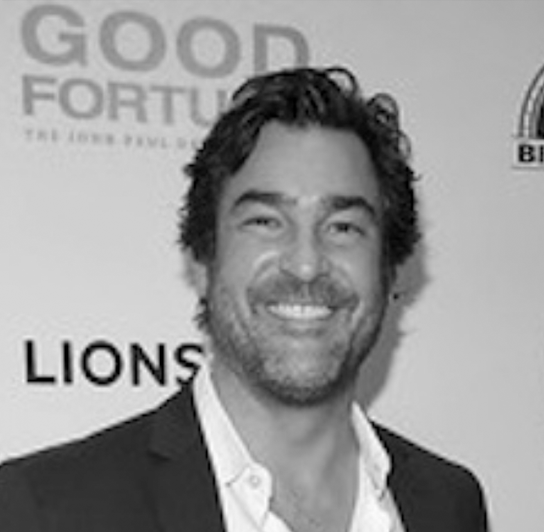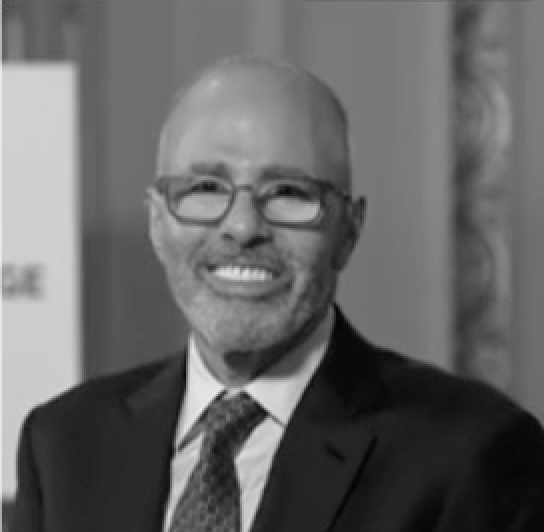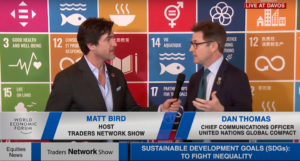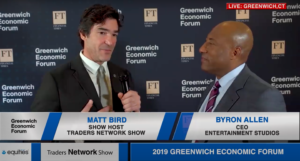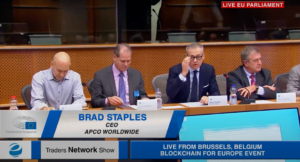Fr. Ezra Sullivan Delivers Project Vision Panel at Humanity 2.0 | Traders Network Show – Vatican City
Contributed by: Show Editorial Team
Fr. Ezra Sullivan, Director of Project Vision, delivers presentation on human flourishing at Humanity 2.0 (Vatican City)
HIGHLIGHTS
- Between 1990-2010, deaths related to air pollution have decreased by 47%
- Between 2000-2017, maternal mortality rate dropped 38% worldwide
- Between 1980-2017, vaccine use in low-income countries increased by 70%
FULL COVERAGE
INTERVIEW TRANSCRIPTS: Fr. Ezra Sullivan, Director of Project Vision at Humanity 2.0
Rev. Philip Larrey – Chairman, Humanity 2.0: 00:00
We’re now going to open the second theme, which deals with project vision. Project vision is the intellectual grounding of the foundation Humanity 2.0. What we’ve done is ask father Ezra Sullivan to take over this project, which he agreed to do. He’s already assembled a team of world-renowned scholars throughout the world they’ve had their first encounter and he is going to present a white paper. We want for the Ezra to give an introduction to project vision what it’s all about. And in order to understand a little bit more about the foundation.
Rev. Philip Larrey – Chairman, Humanity 2.0: 00:47
Last night I was at the North American college rectors dinner with Matt and Frank and Ed. And I’m hoping that father Ezra is still remains humble and father Alejandro as well because I can’t tell you how many seminarians at the North American college. When I asked them, where are you going to study thinking of course the Gregorian, which is the most prestigious Pontifical university, the vast majority told me I’m studying at the Ang. Which is the, a clerical name for the Angilicum. The Angilicum is the university where father Ezra and father Alejandro. Father Ezra is a professor of moral theology. And it was just very inspiring for me to hear so many American seminarians say that they’re studying at the Angilicum and what even said, yeah, I have a moral theologian who’s really cool. His name is father Ezra Sullivan. And I said, “I know him.” And so, we’ve asked him to come to speak to us today and we’re very glad that he’s collaborating with Humanity 2.0.
Rev. Ezra Sullivan – Director of Project Vision, Humanity 2.0: 02:25
Let’s ignore that slide for a second. Before I came to Rome five years ago, and before I dawned this white robe, which Dominican’s officially call a habit, before I was ordained a priest. And before I converted to Catholicism, I was a Californian. My, my French friends like to say were a groovy hippie dude. Well, I was there and I had a car, I had a job and I had a girlfriend. And I remember one time it was late at night and I was with her and we’re sitting right next to each other looking up in the sky, I promise. And I remember looking up there and I actually had a profound experience seeing the stars, seeing the vastness of the universe, this blue canvas all above us. I had a sense of something, and I remember sitting there sort of aw struck for a moment and, and she looks at me and she says, what are you thinking? And I said, it’s hard to explain.
Rev. Ezra Sullivan – Director of Project Vision, Humanity 2.0: 03:55
I said, I have a sense that I’m being prepared for something. And she goes, prepared for what? I don’t know, maybe something important. And I believe that the reason why we’re all here is because we believe that we have a purpose. We have a mission, we have a challenge. If you wanted to call it a calling, we are here because we have opportunities that many in the world don’t have. We have this opportunity to do good. We also have the opportunity if well, if we go down that direction not to do good. And part of the question that I think each of us asks ourselves both every day, but especially in moments like this where we come to Rome, we make time out of our day and we’re asking ourselves, what good should I do? What is it? And so with that, well, I’d like to call California a land of hope.
Rev. Ezra Sullivan – Director of Project Vision, Humanity 2.0: 05:01
Some people say it’s a land of desperation because that’s the furthest you can get before you go into the ocean from, you know, going that direction. But California isn’t just a place where, okay, well we have Hollywood of course, but Hollywood, if you think about it, one of the astonishing things is they still like to tell narratives that give people a vision for the future. What can we do? What sort of worlds can we build? And now Silicon Valley is trying to build those. And that’s part of the reason why we’re here. So we have these opportunities. And of course when I was growing up, I didn’t think about Silicon Valley. It was just getting going. I’m older than I look. I say I don’t drink or smoke. So, well I should say I don’t drink or smoke that much.
Rev. Ezra Sullivan – Director of Project Vision, Humanity 2.0: 05:48
So here we are, then we have these opportunities and we have these abilities to try to leverage our own relationships and our insight, our technology, our power, what should we do? And at first it’s going to seem as if, well the good that we should do, there may not be a clear way forward. It’s quite interesting though because if we look at the place where we are in humanity and certain metrics, we are in a better place than people have been in a long, long time. And so now we can look at the first slide. So if we notice healthy life expectancy at birth, although there is certainly a maternal crisis in terms of maternal health, we’ve certainly seen that at the same time.
Rev. Ezra Sullivan – Director of Project Vision, Humanity 2.0: 06:34
This is not the slide that I wanted to show you. Actually there should be an entirely other one on the internet. Yep. Can you find it? This is true. I mean this, this slide is completely accurate and we noticed that things are getting better. See all of the metrics going up including for Africa, which is at the bottom. They’re noticing that healthy life expectancy is certainly improving. Well we can work with this. We’re flexible. We know also that people are increasing their vaccine use and so this is a sign not only of course, that they’re going to be protected from whatever the vaccine is directly targeted against. This is also a sign of improved healthcare systems in general because if you have a vaccine available to you, this very often is an indicator that there are other medical opportunities.
Rev. Ezra Sullivan – Director of Project Vision, Humanity 2.0: 07:32
And so this is a positive sign that things are getting better. Notice how low the green indicates low income countries. And if you see in the 1980s, it’s below 10%. Here we are now and it’s 2017 and there they have nearly 80% vaccine use. So that’s a very positive sign. Fewer deaths from air pollution. We know that there’s still a long way to go, but if you look back into how dirty the air was compared to how clean it’s getting, then we’ll notice a much bigger difference. So this too is a positive sign that we’re actually passing laws in order to constrain the use of pollutants in the air. And this is leading to positive outcomes for human beings all over the world. We have growing global wealth and I’ve just chosen a few countries in order to talk about the increased per capita total wealth.
Rev. Ezra Sullivan – Director of Project Vision, Humanity 2.0: 08:32
And so we see at the top there’s Norway and then we have Switzerland, Denmark. We know that Greece went through some trouble, but if we look at a longer scale back from 1995 Greece has actually been increasing as well. They just had a little bit of a downturn for well all sorts of reasons. At the bottom, what’s interesting is China, although the GDP of China has really skyrocketed, this is perhaps a better of how China is improving. It’s truly improving but at a slower rate than it seems. If we’re looking at per capita total wealth.
Rev. Ezra Sullivan – Director of Project Vision, Humanity 2.0: 09:04
Here, we have though a problem. It seems as if the increase of wealth is directly connected to depression. Looking at the countries in which they are implementing the sustainable development goals of the UN best, what we find is that there’s a direct correlation between greater wealth and greater depressive disorders. So this is starting to create a question in people’s minds where if things are getting better, how is it they’re also in a certain way getting worse on the same measure. So notice then that the number of people who are increasing in their depression is growing in every single region. One might think that if these other markers of happiness and stability were there, that depression would sort of level off. That’s certainly not happening. And we can notice that as economic growth is continuing. As we saw on the last slide, it’s not just Europe that we’re talking about, this is the entire world.
Rev. Ezra Sullivan – Director of Project Vision, Humanity 2.0: 10:10
Now, if we look at what some scientists have called the happiness index, they try to identify those countries which are happiest according to a number of different measures. So at the very top we have Denmark, which is a happiest if you look at their GDP, so that’s one of the greatest in the world. They also have some of the greatest social supports, so they have hospitals, they have the availability of various resources, and then they also have a greater healthy life expectancy. All these things place Denmark at the top, we also noticed there’s Switzerland, Iceland, Norway, Finland. Those are the top five. And so very often these are shown to us as the countries that we want to emulate because obviously if they’re happiest, how do we become happy while becoming like Denmark, Finland, Switzerland, Norway, Iceland.
Rev. Ezra Sullivan – Director of Project Vision, Humanity 2.0: 11:05
But here’s the problem. The OECD notes, rates of suicide, and here we have Switzerland and then we have Norway and we have Denmark. The happiest countries are the ones who have some of the highest suicide rates. That seems odd, doesn’t it? Why should happiness be correlated with suicide? If we notice people at the bottom of the happiness scale, at least in Europe where they’re still in some way developing some of these goals. Greece, they have much lower suicide rates, but according to the happiness index, they’re near the bottom of Europe. So how is it that the less happy you are, the more you want to live.
Rev. Ezra Sullivan – Director of Project Vision, Humanity 2.0: 11:54
Turkey, even below Greece in terms of suicide rates and then another instance just to see about economic development and so on. We have South Africa, very low suicide rate, so what’s going on here? What is going on with our metrics? Why is it that we can’t quite correlate what’s going on because it seems as if now the happier you are, the more depressed you are and the more you don’t want to live. It’s almost as if the more wealth you have, the less you want to live to have and use that wealth. If we look at standardized suicide rates, what we’ll notice is in this map, apart from war torn areas, which would be some of these areas in central Africa, if we notice then that the greater they are correlated with reaching the sustainable development goals and the greater per capita wealth they have, typically they have a greater tendency toward suicide.
Rev. Ezra Sullivan – Director of Project Vision, Humanity 2.0: 12:57
Shocking. It shocked me when I started looking at this. So the question becomes what then? What kind of metrics should we use if these metrics aren’t quite describing human reality as we think we’re living it, it seems like they’re missing something very important. And in asking this question, well this is where Project Vision came to be. Matthew, father Philip, Morad, they approached me and they said, father Ezra, you don’t have any money. So you don’t have a stake in the game when it comes to how people should spend their wealth. Unless you know they’re going to give it to you. Now what they’re saying is that they’re saying maybe you as a neutral fee figure can gather together this group of scholars from all over the world, from different disciplines. And what we want you to do is to provide a philosophical account of what is true human flourishing, what is it that people are really desiring and what is it that is going to promote the greatest possible flourishing on different levels and different scales.
Rev. Ezra Sullivan – Director of Project Vision, Humanity 2.0: 14:07
So I’d started calling my friends, I started calling my colleagues, I asked my friends to put me in touch with other colleagues. And in a, in a very brief while I was able to gather eight experts and they were from different realms. We had a psychologist, we had a medical doctor, we had someone who is both a lawyer and a businessman. We had an ethicist, someone who’s an expert in feminist literature. We wanted to get the whole range of possible inputs. Of course, we’re just doing a small study. This would require a much larger study if we’re going to see this in the most robust manner possible. So what I’m going to present to you now is a summary of some of our discussions as well as some of our results. And of course every scribe is going to insert his own little doodle to the edge.
Rev. Ezra Sullivan – Director of Project Vision, Humanity 2.0: 14:58
So I take full responsibility for any errors, mishaps, and misunderstandings, but I hope it does faithfully reflect at least some of the results of our scholarly encounter that we had and Project Vision 2019. So first we’re going to start with Aristotle. Aristotle represents in the West the beginning of speech about human flourishing and Aristotle tells us that there are basically five markers that help us to notice what human flourishing is and we’re not going to walk through them entirely, but I’ll just say he noticed that we have to have some kind of pleasure, right? Some an affective positive feeling. He says excellent activity. So whatever your powers are, they want to be to be used at the highest level possible. Friendship is necessary for flourishing, contemplation or use of the mind, recognition of meaning is going to be part of that. And finally he actually says prosperity or success.
Rev. Ezra Sullivan – Director of Project Vision, Humanity 2.0: 16:05
And I want to be clear that he means that partly in a worldly way because he points out that unless we have some sort of level base level of prosperity, then it’s going to be very difficult to reach the highest things. Now, if we compare this to what Martin Seligman says, who is one of the experts of positive psychology. In fact, one of the founders of this in Pennsylvania, he notices that there are five markers. And it turns out that I notice that these are very similar to what we find in Aristotle. Positive emotion, engagement, relationships, meaning achievement, and these perform a dynamic cycle. They all relate to one another and they’re all going to mutually reinforce each other when they’re all present. If one is absent, then the cycle starts to falter. Now the difficulty here though is that of course a lot of questions go to rise and it seems like there’s a lot of things missing.
Rev. Ezra Sullivan – Director of Project Vision, Humanity 2.0: 17:03
And so this is where going from ancient wisdom and modern psychology, while we went to Harvard, because that’s where everybody goes. And so we talked with our friend, professor Vanderwheele, and he shows us that human flourishing involves actually many more elements, some of which were implicit in Aristotle, others of which were not identified by him at all. And he shows us this network of connections. And so what we have to see is in reading this, he points out, for instance, each of these is an element of human flourishing, family, happiness in life satisfaction, work, physical and mental health. And these network nodes, these should be recognized as mutually causal or mutually influencing. And so professor Vanderwheele and his research, each one of these has many footnotes attached to them and he’s done a lot of research in this and he’s hoping to do much more research in the future in order to see how do these mew mutually interact.
Rev. Ezra Sullivan – Director of Project Vision, Humanity 2.0: 18:03
What we see is a static picture. But really these are all a dynamic system. Of course, being a Dominican we used to be known for the inquisition. And so, so we still have, you know, a little bit of that in essence that we always ask questions and we say, can things be improved on? How can we go further? And so I started looking at this and talking with a professor Vanderwheele, asking myself, well, what about the lateral connections? How does family relate to work and human flourishing? This is a big issue. How do we see work and education? And so we noticed there are many areas that still to be explored. And so with my team in our research, we started going further and one of the questions was can we put these into a hierarchy? Abraham Maslow’s hierarchy of human needs gives us the initial start to see whether or not these things are related in a causal fashion.
Rev. Ezra Sullivan – Director of Project Vision, Humanity 2.0: 19:04
And so we noticed that at the very bottom you noticed three types of needs, basic needs, psychological, emotional, self-fulfillment. And he says that unless we have the bottom, we can’t have the higher levels. And this makes a lot of sense. And we were just talking about this for maternal health. If the child does not receive food, water, warmth, rest, or if the mother does not receive that when she’s pregnant, it’s going to be very difficult for her to have security or safety because she’s worrying about the more basic things. And if we don’t have those, if we don’t have security and safety, it’s more difficult to have belongingness. It’s more difficult to feel loved to have these emotional interactions, which are positive. If you’re worried about your food all the time, you might get a little irritable. It’s called hangry. I think we’re all feeling that right now.
Rev. Ezra Sullivan – Director of Project Vision, Humanity 2.0: 19:54
But here’s the thing, I think that Maslow, Vanderwheele, Aristotle, Seligman, they’re all great, they’re wise. And I’m trying to learn from him. I am standing on the shoulders of giants. I am the midget trying to peer a little bit further. And so this is what we did, a new human flourishing map. And what this map is, is the combination of all the research that we did together. And it’s also bringing in the insight of a Dominican from the middle ages, Thomas Aquinas. What he did was he created a scale of what he called love. He called it the ladder of love. There’s a hierarchy says, and the things that we can love, and there’s also a hierarchy of service. And so when we think about it, we know that they’re going to be some things that we love on account of something else. So for instance, we can say, well, why do I, for instance, love exercise?
Rev. Ezra Sullivan – Director of Project Vision, Humanity 2.0: 20:54
Well, some people love exercise because of the goods that it produces and not because of the exercise itself. Right? So I don’t love the pain. I don’t love, you know, the groaning and the sweating. But what I do love though perhaps is feeling healthy. I love the ability to take long walks with my friends. I love the thought that I’m going to live longer if I’m exercising. So what am I doing? Well, I’m loving exercise for the sake of a higher good. And likewise, when we say, well, we want to have maternal health, we want people to be healthy. Why? Because we’re saying that maternal health aides, human flourishing. So these are related to each other causally. And Aquinas will help us to see that these things like a ladder, in a way, the top organizes the bottom and the bottom provides an opportunity for the top.
Rev. Ezra Sullivan – Director of Project Vision, Humanity 2.0: 21:47
So what does this look like? Well, what did we did was we combined all of the other wisdom that we could find, and we started putting it into this human flourishing map. You can see all the way on the left, the flourishing levels at the top. There’s the spiritual level and we have communal flourishing. Maslow was criticized, I think rightly for not recognizing it. It’s not egocentric, flourishing. We have to think about flourishing in communities and then we have individual flourishing as well and we notice that these are going to be related to different needs and Maslow certainly understood the physiological need. If we just look at the very bottom row there.
Rev. Ezra Sullivan – Director of Project Vision, Humanity 2.0: 22:28
We plugged into this system. Everything Maslow’s said plus more so we see that there’s physiological food, warmth, rest, security, safety. What did Maslow miss? Well, I say we actually need toys. How do we know this? Well, because the animal toy industry is huge. You know, it’s millions, hundreds of millions of dollars that people are spending to buy toys for their dogs and their cats. Now if the dog and the cat need a toy, how much more do we need toys? This is why people keep buying new phones, so toys and then we have tools and work. These are actually part of human flourishing. These are exterior from it tools and work shape us and they help aid or they help undermine our human flourishing and we can go all the way up. I’m not going to walk through our map entirely, but to give you a little idea that we’re really trying to see human flourishing as a an integrated whole. Now if you notice, of course I put the spiritual at the top. Why? Because when people have a religion that religion is going to influence everything else they do. Your religion is going to influence how you go about getting food and water, right? Sometimes they’re going to fast during certain and your religion is going to affect the tools and the play and everything else. So again, the top organizes the bottom. The bottom is an opportunity for the top.
Rev. Ezra Sullivan – Director of Project Vision, Humanity 2.0: 23:59
And we noticed too that there are examples of common goods or domains that are much larger than the vision of just the individual good. And so at the very bottom, material goods, physiological needs, healthcare ecology, because these are communal ways of trying to maintain those goods for individuals and then we have world peace. That’s a way to have security and safety, not just for the individual, but as a whole. So here’s the simplified version of the flourishing map. What this is, is I noticed that going back to the bigger one, just for a second. Now the thing is we very often can’t agree on those communal and religious levels. This is where there’s a lot of tension. Sometimes there’s world tension. What does a family, what kind of politics should we have? What sort of organizing society and laws should we have?
Rev. Ezra Sullivan – Director of Project Vision, Humanity 2.0: 24:52
What’s the best way of organizing these things? Precisely because these are sensitive topics where we might not find common ground. What we’ve said is, well, let’s, let’s not get into politics. Let’s not get into religion. That’s precisely what Humanity 2.0 is founded on is the common ground that we can all have bracketing these concerns. Not that they’re not important, but noticing that we can actually focus on individual human flourishing in a common way without getting into those bigger arguments. So this is the simplified version of our flourishing map. And this is just what we saw just with the two top layers bracketed. What this means is if we have this as a flourishing map, this also provides us with very explicit metrics or identifiers for individual flourishing. So if you notice physiological flourishing, just as in terms of a goal, when people know what that goal is, they can make a dashboard for it, they can help to give each other measurements for what is going to be reached.
Rev. Ezra Sullivan – Director of Project Vision, Humanity 2.0: 25:59
And of course we know that the more specific the goal, then the greater granting granularity you can have in measuring it. So what we’re talking about are high level goals that will be defined more precisely by the sciences that study these areas. So if you have physiological flourishing, you have access to adequate food, warmth, rest, you have access to healthcare services. If you have physiological flourishing, you live in safety, you have local peacekeeping forces that are performing their jobs adequately. Experiential flourishing is going to be a bit higher. Notice that there’s a column there. It says affirms one body in a balanced way. I’m going to get to this at the very end. I just want to point that out. Affirms one’s body in a balanced and some ways are sports. Exercise, just being in nature. We go up a little bit higher. Experiential flourishing includes, has access to adequate toys and play. It’s true. Aquinas used has to have a saying. He said that if you have a bow that’s always stretched, eventually your arms will grow weak or the bow will break. And that’s what we call chronic stress. The stretching of the bow, the stretching of yourself, the feeling that you never have rest. You’re always at work. You never actually experienced the joys of life. So this is why we say actually play is important, but it’s contextualized within this larger whole. Maslow didn’t talk about play.
Rev. Ezra Sullivan – Director of Project Vision, Humanity 2.0: 27:29
Now if those are indicators of human flourishing, then what obstacles are we to focus on? And the answer to that is we can both look at this in terms of what are the obstacles measured by people’s concerns. You can do Google searches, you can look at the massive Google searches and the things that come to mind. But of course those are always going to be influenced by concerns of media, politicians, right? People’s concerns are related to tweets and of course, you know, rumors, rumors of Wars and rumors of rockets and then suddenly all these disappear. Well, so we have to look deeper than just immediate concerns of people. We have to look deeper. What are the deeper obstacles, those things which stop us from flourishing, not just challenges, but those things that actually make it so we can’t flourish. So for example, let’s talk about globalization for a second or technology. Technology and globalization go together, right? So everybody likes to complain about phones and we like to complain about social media and then we use it all the time. What does that mean? Does that mean that we’re schizophrenia? Yes. No, it means that we see that it’s a good, it can be bad. It’s a tool. It’s a challenge. It’s not an obstacle, which means it can be put to good use.
Rev. Ezra Sullivan – Director of Project Vision, Humanity 2.0: 29:04
So here are some of the influential hotspots that we identified. If the top are the indicators, then of course that’s going to help organize everything else. Because your character has a well-formed character, is going to be one of the most important things that affects everything else. If somebody has a bad character, they’re not going to work for helping supply healthcare. If they have a bad character, they don’t want to help people to have better ecology. Why? Because we all know that it’s actually people who are good inside that start to do good outside. And so it’s a top down model. And what happens is we need to have the bottom physiological flourishing. So people live and exist and then we want to form those people. So as they grow up and they flourish, now they have this self-giving cycle. And so this is why we identified some of the suppliers, schools, communications, media, these influence people’s character.
Rev. Ezra Sullivan – Director of Project Vision, Humanity 2.0: 30:03
And we go down, we notice technology has a huge effect a disproportionate effect on human character now because now people spend more time with technology than they do people. And then finally we have affirms one’s body in a balanced way. This is something that Jennie Joseph was implicitly talking about when she said that, you know, sometimes the way to fix maternal health complications and the way to improve birth is not by an app. It might not be solvable in the Mac store, she says it’s human interaction and affirming their body, affirming their goodness, helping them to emotionally flourish is going to help them physiologically flourish. It seems obvious, but it’s a point well worth emphasizing. So affirming one’s body in a balanced way is extremely important and this is one of the goals of the Humanity. 2.0 maternal health lab is to affirm the goodness of the body and in a deep, meaningful way instead of trying to technologize everything instrumentalize it such that we become shaped by technology rather than we using technology to help shape each other for a better future. So what’s our conclusion then? How do we move forward? What we can say is that we’ve identified a map of flourishing. We’ve identified a number of the indicators that will help us to measure accurately what we’re looking for. We’ve noticed some of the hot spots and we’ve also noticed that there’s a way forward. And the fact that we’re all here shows us that there is a way forward. Thank you.
For link to original article, click here
All rights reserved to the Traders Network Show. No part of this publication may be reproduced, distributed, or transmitted in any form or by any mean including; photocopying, recording, or other electronic or mechanical methods, without prior written permission of the publisher, except in the case of brief quotations embodied in critical reviews and certain other noncommercial uses permitted by copyright law. For permission requests, write to the publisher addressed “Attention: Permissions Coordinator”

